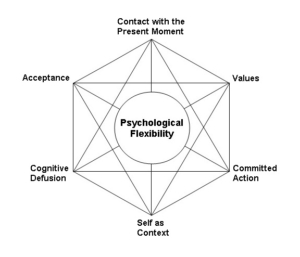Acceptance & Commitment Therapy (ACT) by Bmindful Psychotherapists in Ottawa
We are a group of highly trained independent professionals in Ottawa, who also work(ed) at Carleton University, Algonquin College and at CHEO. We use Third Wave Cognitive Therapeutic Approaches to treat anxiety, depression, ASD, ADHD, and life challenges such as burnout, academic stress, life dissatisfaction, parenting stress, or chronic pain or menopausal symptoms management.
Introduction to ACT

The Hexaflex Model of ACT
ACT is a treatment approach that combines experiential, behavioural and mindfulness interventions. It puts emphasis on the “here and now” and aims to help individuals develop self-awareness of the mind-body connection (thoughts, emotions and body sensations). ACT focuses on acknowledging difficult experiences for what they are, and on how one can relate to struggles with more psychological flexibility and acceptance. Individuals are invited to work on what is important for them with the use of values and committed actions. Many interventions are focused on skills building and actions with the aim of improving one’s well-being and emotional state.
Acceptance and Commitment Therapy may be used for the treatment of anxiety, depression, parenting stress, working with chronic pain, managing menopause related symptoms, university or college difficulties, and ADHD. You and your therapist may spend some time deciding what problems and goals you want to focus on.
Psychological Flexibility: The Six Core Processes of Act (excerpt from Dr. Rush Harris)
- Contacting The Present Moment means being psychologically present: consciously connecting with whatever is happening right here, right now.
- Defusion means learning to step back or detach from unhelpful thoughts and worries and memories: instead of getting caught up in your thoughts, or pushed around by them, or struggling to get rid of them, you learn how to let them come and go – as if they were just cars driving past outside your house. You learn how to step back and watch your thinking, so you can respond effectively – instead of getting tangled up or lost inside your thinking.
- Acceptance means opening up and making room for painful feelings and sensations. You learn how to drop the struggle with them, give them some breathing space, and let them be there without getting all caught up in them, or overwhelmed by them; the more you can open up, and give them room to move, the easier it is for your feelings to come and go without draining you or holding you back.
- The Observing Self is the part of you that is responsible for awareness and attention. We don’t have a word for it in common everyday language – we normally just talk about the “mind’. But there are two parts to the mind: the thinking self – i.e. the part that is always thinking; the part that is responsible for all your thoughts, beliefs, memories, judgments, fantasies etc. And then there’s the observing self – the part of your mind that is able to be aware of whatever you are thinking or feeling or doing at any moment. Without it, you couldn’t develop those mindfulness skills. And the more you practice those mindfulness skills, the more you’ll become aware of this part of your mind, and able to access it when you need it. (The technical term for this, in ACT, is ‘self-as-context’.)
- Values are what you want your life to be about, deep in your heart. What you want to stand for. What you want to do with your time on this planet. What ultimately matters to you in the big picture. What you would like to be remembered for by the people you love.
- Committed action means taking action guided by your values – doing what matters – even if it’s difficult or uncomfortable.
Note: Material above is for general information purposes. If you would like to learn more about ACT please visit our resources page. You will find there links to the original article by Dr. Rush Harris.
